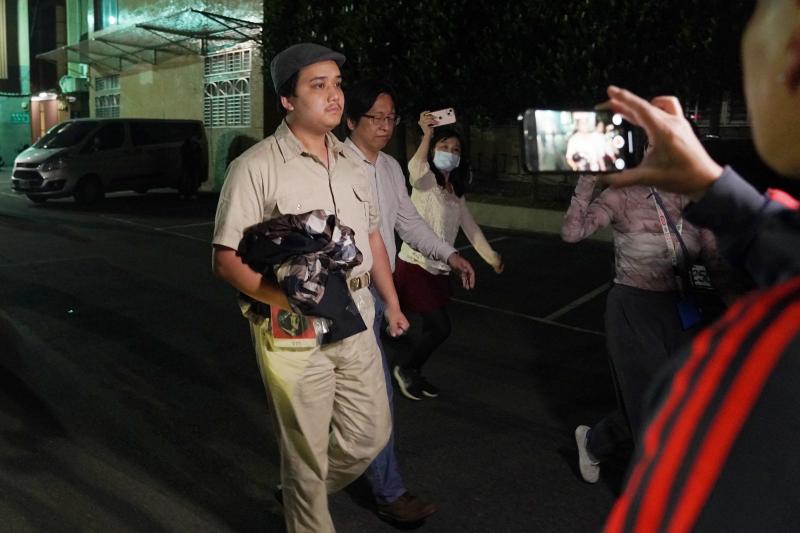The Chinese Nationalist Party (KMT) today expressed its "firm opposition to Nazism" after an activist leading a KMT-supported recall campaign against a lawmaker in New Taipei City was widely condemned for displaying Nazi symbols.
"The KMT firmly opposes Nazism, fascism and any form of totalitarianism or human rights persecution," the party said in a statement on Facebook.

Photo: CNA
"Those involved have clearly stated many times that the action has nothing to do with the KMT," the statement said, without clarifying whether or not the activist is a KMT party member.
Instead, the KMT said that the Democratic Progressive Party (DPP) has a "dark history of using Hitler in its propaganda" and "using Nazi issues to discredit its opponents."
Sung Chien-liang (宋建樑), the leader of a KMT-backed campaign to recall DPP Legislator Lee Kuen-cheng (李坤城), wore a Nazi armband and carried a copy of Adolf Hitler's Mein Kampf into the New Taipei District Prosecutors' Office yesterday evening where had been summoned for questioning.
Sung, who is suspected of involvement in signature fraud relating to the recall vote campaign, repeatedly performed a Nazi salute in front of reporters, sparking a media frenzy.
The incident led to the Ministry of Foreign Affairs issuing a statement denouncing Sung's actions, as well as other statements of condemnation from international organizations in Taiwan including Israeli and German representatives.
This morning, when asked about Sung's display of Nazi symbols, KMT Chairman Eric Chu (朱立倫) told reporters that "all kinds of ways are satirizing the DPP dictatorship."
However, in the afternoon at a KMT central party meeting Chu said the KMT "firmly opposes" fascist, Nazi and communist dictatorships, and suggested that the DPP wanted to "lock up" opposition party members.
The KMT Youth League issued a statement on Facebook in which it said "improper symbols and behavior should never be accepted as a legitimate form of civic activities or advocacy under any circumstances."
The KMT Youth League also said that Sung "has never been" a member of their group.

POSITIVE DEVELOPMENT: Japan and the US are expected to hold in-depth discussions on Taiwan-related issues during the meeting next month, Japanese sources said The holding of a Japan-US leaders’ meeting ahead of US President Donald Trump’s visit to China is positive news for Taiwan, former Japan-Taiwan Exchange Association representative Hiroyasu Izumi said yesterday. After the Liberal Democratic Party’s landslide victory in Japan’s House of Representatives election, Japanese Prime Minister Sanae Takaichi is scheduled to visit the US next month, where she is to meet with Trump ahead of the US president’s planned visit to China from March 31 to April 2 for a meeting with Chinese President Xi Jinping (習近平). Japan and the US are expected to hold in-depth discussions on Taiwan-related issues during the

‘LIKE-MINDED PARTNER’: Tako van Popta said it would be inappropriate to delay signing the deal with Taiwan because of China, adding he would promote the issue Canadian senators have stressed Taiwan’s importance for international trade and expressed enthusiasm for ensuring the Taiwan-Canada trade cooperation framework agreement is implemented this year. Representative to Canada Harry Tseng (曾厚仁) in an interview with the Central News Agency (CNA) said he was increasingly uneasy about Ottawa’s delays in signing the agreement, especially as Ottawa has warmed toward Beijing. There are “no negotiations left. Not only [is it] initialed, we have three versions of the text ready: English, French and Mandarin,” Tseng said. “That tells you how close we are to the final signature.” Tseng said that he hoped Canadian Prime Minister Mark Carney

President William Lai (賴清德) yesterday bestowed one of Taiwan’s highest honors on Saint Vincent and the Grenadines (SVG) Ambassador Andrea Clare Bowman in recognition of her contributions to bilateral ties. “By conferring the Order of Brilliant Star with Grand Cordon on Ambassador Bowman today, I want to sincerely thank her, on behalf of the Taiwanese people, for her outstanding contribution to deepening diplomatic ties between Taiwan and SVG,” Lai said at a ceremony held at the Presidential Office in Taipei. He noted that Bowman became SVG’s first ambassador to Taiwan in 2019 and

A man walks past elementary school artworks at the Taipei Lantern Festival in Ximen District yesterday, the first day of the event. The festival is to run from 5pm to 10pm through March 15.